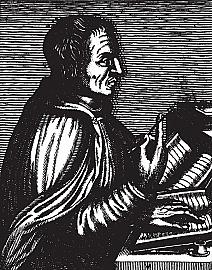
Periodically, I share a story sent to me via e-mail from Christian History magazine. This one, which highlights the fight for maintaining orthodoxy and the ability to unite those who are true Christians despite minor differences, was inspiring to me. I hope you find it to be also.
HILARY OF POITIERS was one of the best-known churchmen of the fourth century. His fame rested largely on the holiness of his conduct and his defense of orthodox Christianity. However, Hilary was also the first bishop known to write hymns in Latin, the first western bishop to write commentaries about entire Bible books, and the mentor of one of the most famous saints of all time: Martin of Tours.
Born around 300 into a well-to-do pagan family, Hilary got a good education. When he was middle-aged, he converted to Christianity, explaining that paganism did not satisfy his longing to do something worthwhile for his creator. Although he was married and had a daughter, the people of Poitiers drafted him to be their bishop.
Hilary took such a strong position against the Arians (who denied the divinity of Christ) that in 355 Emperor Constantius, who was an Arian, exiled him to Phrygia in Asia Minor. In Phrygia, Hilary visited many churches to see for himself the state of the faith there. He found the level of Christianity low and Arian doctrines taught in many churches.
This prompted him to write a book on Christian faith with special emphasis on the Trinity and on refuting Arianism. This twelve-part book was the first attempt at a systematic theology in Latin. Although difficult to read, it brought arguments against Arianism to the west where few could read Greek. Hilary argued that if Christ is a created being and we worship him, we are idolaters. The fact that Christ is God ennobles us, said Hilary. “That He as God should abide in our flesh is in turn a renewal of us from fleshly nature into God.”
During his exile, Hilary also reached out to the semi-Arians. Many of these were at heart orthodox but rejected the Nicene Creed because it used the word homoousios (“of the same substance”) which they thought weakened the distinction between Father, Son, and Spirit. Hilary noted that one of the semi-Arians, Eleusius, bishop of Cyzicus, led a blameless life.
To win over these Christians, Hilary wrote a history of how contemporary councils had produced shifting professions of faith. He explained the issues so that semi-Arians could understand what was at stake, and called on orthodox Christians to accept semi-Arians who were not wilful heretics. When he returned to Poitiers his conciliatory attitude led all the semi-Arians of Gaul to reconcile with the orthodox church.
Hilary died on 13 January 368. In the following centuries, Augustine of Hippo, Jerome, and others spoke highly of his work and character.
